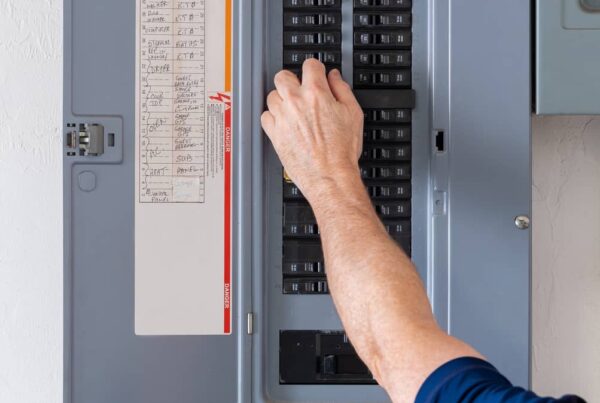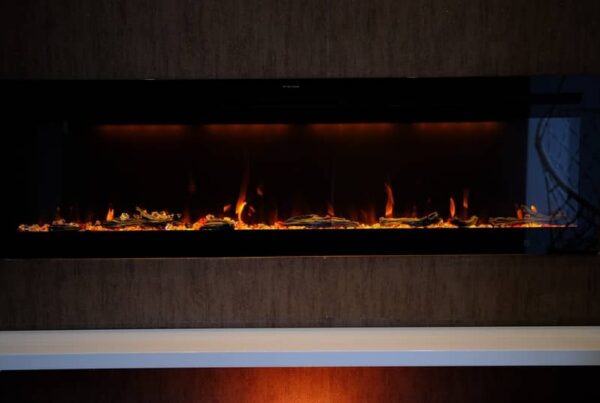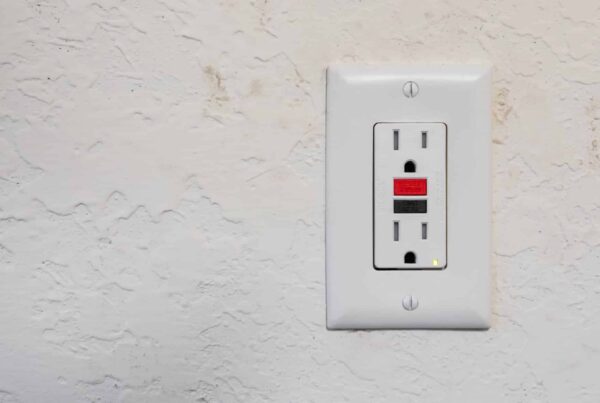
We are a home inspection company, so you could say we get A LOT of common electrical questions from home buyers, sellers, and real estate agents.
That being said, here are the most common questions we receive, followed by their answers from a licensed home inspector.
What is an AFCI?
An AFCI is an arc-fault circuit interruptor and its job is to stop electric flow when an “arc” or surge is detected. This would happen if wires are damaged.
Typically, AFCI’s come in the form of circuit breakers and are installed in newer electrical panels. AFCI’s protect bedroom circuits in most cases.
If you would like to read more about AFCI’s, click here.
What is a GFCI?
A GFCI is kind of like an AFCI. However, GFCI are for ground faults. This means the electric current takes a different path other than what is in the circuit. For instance, if an appliance malfunctions and then shocks a person. A GFCI in that case, would sense the different path of electric current and stop electric flow or “trip”.
GFCI’s are required to be around water so, think in bathrooms and kitchens. If you would like to read more about GFCI’s, click here.
Is My Panel Safe?
This is kind of a loaded question to answer over a blog and you should pay attention to a home inspector when they begin talking about your electrical panel for better insight.
However, in most cases, this is what could make your panel unsafe:
- Federal Pacific Panels
- Sylvania/Zinsco Panels
- Challenger Panels
- Fuse Boxes
- Double Taps
- Cloth wiring
- Aluminum Wiring
Do I have enough service amps to supply my home?
In most cases, your home only needs 150amps, but it depends on the size and the type of appliances. For instance, an older condo with gas appliances may only need 100 amps!
On the other hand, a brand new home with electric appliances, two dryers, and other nice gadgets may need 200 amps or more.
It’s important to speak with an electrician or home inspector if you are suspecting you do not have enough amps to service your home. However, you can also complete calculations.
I read an article earlier from an electrician that states if you do not have 200 amps service, you should call them to enter the “modern age”. This is just false.
Why Are My Lights Flickering?
If you lights are not LED bulbs, this can be because they have a loose connection somewhere. Either from the socket, in the panel, or in the wiring.
If you do have LED bulbs and your lights are flickering, this is mostly due to the bulbs themselves. I would recommend replacement. A lot of times brand new homes have LED bulbs that flicker because they are cheaper bulbs.
Why Do My Breakers Keep Tripping?
Breakers can trip simply because they are worn out/older. However, they could also be tripping because of an underlying problem with a wire or an appliance. Check the circuit and appliances the breaker is on to see if that could be the root of the issue.
In most cases, breakers are cheap and just have to be replaced overtime.
Why Is My Dimmer Switch Hot?
Dimmer switches use more electricity inside the switch so it’s normal they are warm or a little hot. Any switch however, that is over 130 degrees Fahrenheit should be replaced!
Why are my outlets not working?
Outlets can stop working because of they are on a switch, they are simply broken, the wiring is bad, or the breaker has tripped.
You should test the breaker and other bedroom switches first, and then try replacing the outlet. Furthermore, understand that outlets are typically on a circuit. Therefore, if a circuit is interrupted before any outlets, all of the other outlets/power down the circuit will stop operating.
Have More Common Electrical Questions?
Comment below or contact us! We are happy to help!



